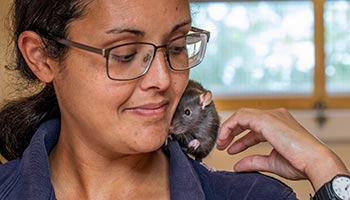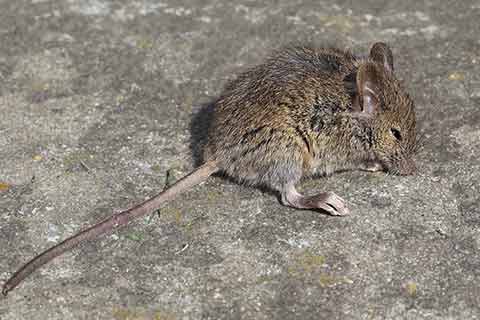Sick or injured rodents
This advice covers wild rats and mice (specifically brown rats, wood mice, house mice, and yellow-necked mice). It also applies to other species of mice such as harvest mice and hazel dormice, but they aren't usually found in homes or gardens.

I've found a sick or injured rodent
The easiest way to confine a sick or injured small rodent is by carefully placing a towel over the animal, and lifting it into a box. Use a plastic box, as rodents can chew through cardboard quickly. They can have a sharp bite, especially if they're scared or in pain, so always be very careful when handling and use a thick towel as well as wearing gloves.
Keep the box in a warm quiet place, away from any pets, and call a vet as soon as you can. Unfortunately, a lot of the time, sick or injured wild animals are in a very bad state by the time they can be caught, and the kindest thing for the vet to do is to put the animal to sleep, so please be prepared that they may need to take that difficult decision.
I've found a baby rodent
If the young animal is moving around, has fur covering its body and its eyes are open, the best thing to do is leave it alone. Their parents are likely to be nearby, so don't touch them unless they're in immediate danger and they need to be moved a very short distance to a safe place. You might find a single baby mouse that's been dropped by its mother, because they move their young to a different nest if they've been disturbed. Keep away and monitor the baby, as the mother should come back to pick it up within a few hours.
How to tell they need help
If any of the following apply, the babies will need rescuing as they may be orphaned:
- The baby rodent has no fur or its eyes are closed, and it's out of the nest
- You can see the dead parents nearby
- The parents haven't returned to the nest after two hours of monitoring
Put them in a safe box to transport them
You can rescue baby rodents by picking them up carefully, wearing gloves, and putting them into a plastic box. The box should be lined with towels to keep them warm. Please don't try to give them food or water, as this can do more harm than good. Put the box in a quiet, warm place away from pets, and take it to a vet as soon as possible.
Please don't try to look after them yourself - wild rodents have very different needs to pet rats and mice, and they need specialist care to give them the best chance of release back into the wild.
I've found a rodent nest
If you come across a nest of baby rodents, then it's best to leave them alone as too much disturbance can stop the mother from coming back to look after them. Cover the nest back up, and the parents are likely to return within a few hours. If the parents haven't come back after two hours, follow the advice above for orphaned rodents.
Once the young rodents have left the nest, usually about a month after they were born, you can remove the old nest and block up any access holes. If you need any help with this, contact your local council's pest control department, or an independent pest control company.
Hazel Dormice are legally protected
If the nest belongs to hazel dormice, the dormice and their nest are legally protected from being disturbed or destroyed. Don't touch the nest, as you'll need to contact Natural England or Natural Resources Wales, or your local mammal group, for specialist advice. Visit the Mammal Society's website for help with identifying hazel dormice and their nests.
My cat's brought in a rat/mouse that's still alive
If your cat's brought in a live rat or mouse that doesn't seem injured and is moving around, you can help it find a way out of your house on its own. You can do this by leaving open doors to create a route straight outside, and shutting all other doors. Keep your cat and any other pets well away when you do this. You could also try using a live-capture trap baited with food, but make sure you check the trap every two hours so the rodent isn't left in there for too long. Then release them outside.
If the rat or mouse is alive but not moving, and you can confine it, follow the advice below for injured rodents. Being in a cat's mouth can cause injuries that you can't see, so if they're not moving around they may be in shock from being caught.
Worried about your cat hunting wild rats or mice? Read our advice for cat owners on how to prevent your cat hunting wildlife.
Deterring rodents
We recommend using humane methods to deter rats and mice from your home and garden. For more information about deterring rodents see our article on humane rodent control.




